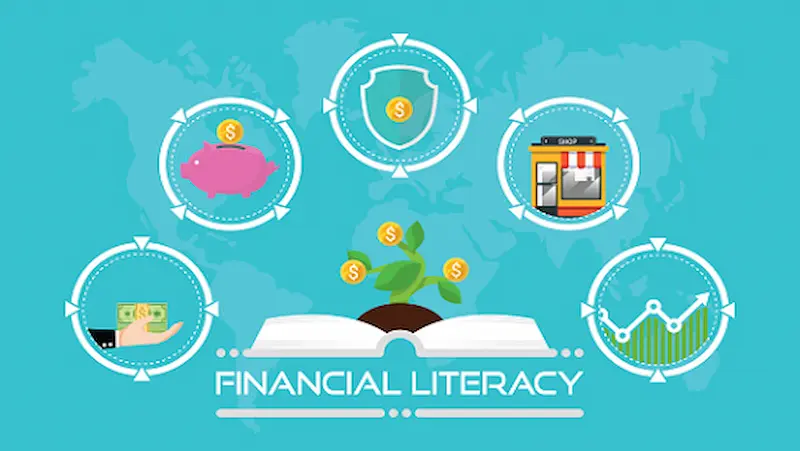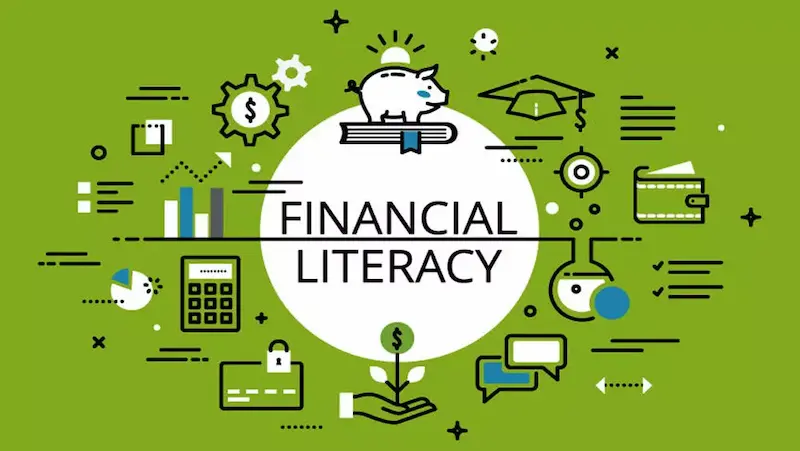In the intricate tapestry of economic existence, the vitality of financial literacy transcends mere comprehension—it is the keystone to unlocking the portals of fiscal empowerment. Embodied in the language of numbers and transactions, this proficiency becomes the compass navigating the labyrinth of personal and societal wealth. Its importance lies not just in understanding the numbers but in harnessing them as instruments of informed decision-making. Join the expedition into the realm of activities for financial literacy, where each insight is a stepping stone towards a more sagacious financial landscape.
Table of contents
Understanding Financial Literacy

Decoding Financial Literacy
In the complex world of finances, understanding financial literacy is like deciphering a cryptic code. It involves unraveling the intricacies of money matters and empowering individuals to navigate the fiscal landscape with confidence.
The Crucial Cogs
1. Budgeting:
Mastering the art of budgeting is akin to orchestrating a symphony of income and expenses. It’s about allocating resources wisely, and ensuring that every financial note plays harmoniously.
2. Saving:
Saving isn’t just about stashing cash; it’s a strategic dance between present and future needs. It’s the foresight to prepare for the unpredictable choreography of life.
3. Investing:
Investing transforms money into a dynamic force. It’s a calculated risk, a financial ballet where individuals engage with markets to amplify their resources over time.
4. Debt Management:
Navigating the labyrinth of debt requires finesse. It’s the art of balancing financial obligations without compromising the rhythm of one’s overall fiscal health.
The Alarming Numbers
The canvas of financial illiteracy is painted with troubling statistics. A significant portion of the population struggles with deciphering the financial code, leading to pitfalls that could be avoided with the right knowledge.
Why Engage in Financial Literacy Activities
In the pursuit of financial enlightenment, one unveils a trove of treasures that transcend the mundane rhythms of monetary existence. Behold the reasons to embark upon the journey of financial literacy:

Benefits of Financial Literacy:
Witness the metamorphosis of your financial acumen. Unveil the power to decipher the cryptic language of investments, budgeting, and savings. With this knowledge, wield the sword of informed decision-making, vanquishing the dragons of debt and uncertainty. Financial freedom becomes not just a concept but a tangible realm, where prosperity reigns supreme.
The Consequences of Financial Illiteracy:
Peer into the abyss of ignorance, where fiscal chaos lurks in the shadows. The uninitiated navigate the labyrinth of pitfalls, from the treacherous terrain of debt traps to the stormy seas of impulsive spending. Financial illiteracy begets a kingdom of missed opportunities, where dreams wither and aspirations crumble. Guard against this dark descent; let financial literacy be the lantern illuminating your path.
Activities for Children
In the intricate dance of early childhood development, an often overlooked partner is financial literacy. While crayons and building blocks dominate the scene, instilling a sense of money management for kids matters early on is a chore (pun intended) worth tackling. Here’s why and how:

Importance of Teaching Kids About Money
Let’s not sugarcoat it – the world runs on currency. Teaching kids about money is like providing them with a compass for navigating reality. It’s not just about the dollars and cents; it’s about understanding choices, needs, and the art of prioritizing. Consider it an investment in their future financial education for kids.
Age-Appropriate Activities
1. Setting up a Piggy Bank
Introduce the concept of saving by giving your little one a cozy home for their spare coins. The piggy bank becomes a tangible lesson in delayed gratification. As the piggy grows, so does the pride in accomplishment.
2. Creating a Chore-Based Allowance System
Make chores a gateway to financial responsibility. Assign age-appropriate tasks, attach a modest reward, and watch responsibility blossom. It’s not just about earning; it’s about understanding the correlation between effort and reward.
3. Playing Financial Literacy Games For Kids
Turn learning into a game. Whether it’s a board game or a digital app, there are numerous resources designed to make financial education engaging. Financial Literacy Games For Kids sneakily teach budgeting, decision-making, and even a bit of entrepreneurship in a fun, interactive way.
Activities for Teens

Building on Foundational Knowledge
In the vast realm of teenagehood, the journey toward self-discovery and personal growth is as crucial as it is exhilarating. As the foundational years lay the groundwork for the future, it becomes imperative to foster an environment that not only imparts knowledge but cultivates a deeper understanding of life skills. Here, we delve into activities that go beyond the ordinary, offering teens a chance to build on their foundational knowledge in a way that transcends the conventional learning experience.
Interactive Learning Experiences
Budgeting Simulations: Navigating the Financial Landscape
In a world where activities for financial literacy for students are often neglected in traditional educational settings, budgeting simulations emerge as a beacon of practical wisdom. These simulations transcend the theoretical and plunge teens into the intricate world of personal finance for kids. Picture this: a virtual realm where teens grapple with real-life scenarios, making decisions about budgeting, expenses, and savings. From managing day-to-day costs to navigating unexpected financial challenges, these simulations instill a sense of fiscal responsibility, preparing teens for the fiscal journey that awaits them beyond the classroom.
Investing in a Mock Stock Market: Deciphering the Language of Finance
For many teens, the intricacies of the stock market may seem like an enigma wrapped in uncertainty. Enter the realm of mock stock markets, where the theoretical becomes tangible. Teens are bestowed with virtual currency to invest in a simulated stock market, mirroring real-world trends and fluctuations. This hands-on experience not only demystifies the complex language of finance but also cultivates strategic thinking and decision-making skills. As they track their investments, teens learn the art of risk assessment and the impact of global events on financial markets – lessons that extend far beyond the virtual domain.
Entrepreneurship Challenges: Nurturing the Seeds of Innovation
In a world driven by innovation, fostering an entrepreneurial spirit is paramount. Entrepreneurship challenges offer a platform for teens to unleash their creativity and problem-solving skills. From conceptualizing a business idea to creating a viable business plan, teens embark on a journey that mirrors the challenges faced by real-world entrepreneurs. This immersive experience not only nurtures their ability to think outside the box but also instills resilience in the face of setbacks. Through collaboration and critical thinking, teens emerge from these challenges with a newfound appreciation for the entrepreneurial mindset, laying the groundwork for potential future ventures.
Activities for Adults

Reinforcing Financial Literacy in Adulthood
The alchemy of financial literacy is not confined to the classroom. It’s an ongoing process, a perpetual quest for knowledge that evolves with the changing tides of economic landscapes. To reinforce financial literacy in adulthood, engaging in unconventional yet enlightening activities is paramount.
Practical Financial Exercises: A Dive into the Fiscal Abyss
Personal Budgeting Workshops: Unleashing the Financial Maestro
Imagine a workshop that transforms the tedious chore of budgeting into a captivating symphony of financial empowerment. Attendees, not mere spectators but active participants, immerse themselves in the art of sculpting their fiscal destinies. Personal budgeting workshops transcend the mundane spreadsheet, fostering a visceral connection with one’s financial landscape. It’s a journey where numbers cease to be mere digits; they become stepping stones towards financial prowess.
Debt Reduction Strategies: Conquering the Debt Dragon
In the realm of practical financial exercises, debt reduction strategies stand as the valiant knights ready to slay the debt dragon. Imagine a scenario where individuals, armed with knowledge and practical tools, engage in a collective battle against the shackles of debt. These exercises are not merely theoretical abstractions; they are battle-tested maneuvers, each participant equipped with a personalized arsenal to conquer their debt demons. It’s a collaborative effort, a fellowship against financial adversity.
Retirement Planning Seminars: Crafting the Tapestry of Golden Years
The prospect of retirement often looms as a distant mirage, yet its importance cannot be overstated. Retirement planning seminars, unlike conventional lectures, morph into immersive journeys into the future. Participants don’t just learn about retirement; they envisage it, plan it, and construct a roadmap to their golden years. These seminars are not dull monologues; they are dynamic dialogues where individuals sketch the canvas of their retirement dreams with financial prudence as their paintbrush.
Activities for Seniors

Tailoring Financial Literacy for Retirees
In the grand tapestry of life, the golden years beckon, adorned with unique challenges and opportunities. Seniors, like seasoned voyagers navigating uncharted waters, find solace in understanding the intricate currents of financial literacy tailored specifically for retirees.
Preparing for Retirement
Understanding Pension Plans and 401(k)s
As the sun of a career begins its descent, the financial landscape transforms into a twilight of pensions and 401(k)s. Seniors, akin to scholars deciphering ancient scripts, engage in sessions where the arcane secrets of pension plans and the labyrinthine corridors of 401(k)s are unveiled. These gatherings become sanctuaries of wisdom, guiding retirees through the mystic nuances of financial stability.
Estate Planning Workshops
In the symphony of life’s progression, estate planning emerges as a sonnet echoing through the corridors of time. Seniors, the architects of their legacy, immerse themselves in workshops that are more than mere financial forums; they are sacred spaces where individuals mold the clay of their inheritance. Amidst the dialogue of wills and trusts, the workshops become crucibles, shaping the destiny of wealth and values for generations to come.
Health Care and Medicare Financial Discussions
In the theater of aging, health care and Medicare take center stage, demanding not just attention but an orchestrated understanding. Seniors, no longer passive spectators, participate in financial discussions that unravel the enigma of medical expenses and insurance policies. These sessions become colloquiums where the dialect of financial wellness intertwines with the pulse of healthcare, crafting a bespoke melody for the twilight years.
Conclusion
In summary, optimal enhancement of juvenile fiscal cognizance transpires through purposeful engagements, fusing tangible experiences and playful erudition, fostering an indelible imprint on nascent minds’ fiscal discernment.
To get your hands on more educational and free resources on coding for kids, robotics for kids, financial education for kids, etc., do check out the BrightCHAMPS Page now!
To get your hands on more such articles, educational content, and free resources on coding for kids, robotics courses, game development, etc., check out the BrightCHAMPS Blog Page now!
Frequently Asked Questions
A1. Financial literacy is the ability to understand and use various financial skills, including personal financial management, budgeting, and investing.
A2. Financial literacy is crucial as it empowers individuals to make informed and effective decisions about their money, leading to greater financial stability and well-being.
A3. Elevate your activities for financial literacy by actively seeking educational resources, attending workshops, and staying informed about economic trends. Practice budgeting and smart spending habits.
A4. Explore noteworthy books such as “The Millionaire Next Door” by Thomas J. Stanley and William D. Danko, or “Rich Dad Poor Dad” by Robert T. Kiyosaki.
A5. Yes, numerous platforms offer free activities for financial literacy courses, such as Khan Academy, Coursera, and Investopedia.
A6. Common misconceptions include equating financial literacy with wealth, and assuming it’s only relevant for adults. In truth, it’s about making informed financial decisions at any age or income level.
A7. Teach children about money through hands-on experiences, involve them in budgeting decisions, and encourage savings. Use age-appropriate resources like games to make learning enjoyable.


 We are an army of educators and passionate learners from BrightChamps family, committed to providing free learning resources to kids, parents & students.
We are an army of educators and passionate learners from BrightChamps family, committed to providing free learning resources to kids, parents & students.














